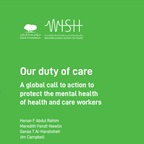Protecting & supporting health and care workers
From deaths, illness, burnout and mental health issues experienced during COVID-19 to attacks and harassment in conflict zones, health and care workers around the world face occupational hazards and risks. The World Health Organization projects a global deficit of 11 million health workers by 2030, with two regions bearing an increasing proportion of the gaps. Urgent action is needed to protect, support and safeguard health and care workers as a vital component of strong and resilient health systems.
The Global health and care worker compact identifies ten areas of focus within four domains – preventing harm, providing support, ensuring inclusivity and safeguarding rights –where governments and societies can improve the work environments and rights realization of the people doing health and care work. The Health and care worker law and policy lab consolidates national laws across each of those domains along with a guide to the existing international legal obligations to safeguard the rights of health and care workers and ensure that they have decent and enabling work environments. It is housed at https://www.hcwpolicylab.org/.
Well-designed and implemented laws and policies support health and care workers, improve retention, and support their engagement in health systems, efforts to end future pandemics, and improve global public health. Law is among the most powerful public health tools to support those doing lifesaving work in clinics and hospitals, homes and care facilities, war zones and climate disasters. The first step in applying this tool is understanding how national laws may or may not support that goal.
Arriving in summer 2025: Full and abridged assessment tools to support national policy review and planning.
Publications

Global health and care worker compact
Health and care workers need safe, healthy, supportive and dignified conditions of work. The Global health and care worker compact provides recommendations...

Working for Health 2022-2030 Action Plan
The Working for Health 2022-2030 Action Plan presents how WHO, Member States, and stakeholders can jointly support countries to optimize, build and strengthen...

This thematic brief accompanies the Working for Health 2022–2030 Action Plan, serving as a rationale to the related actions of the Working for Health...

Caring for those who care: Guide for the development and implementation of occupational health and safety...
Occupational health and safety programmes aim to prevent diseases and injuries arising out of, linked with or occurring in the course of work, while improving...

Caring for those who care: national programmes for occupational health for health workers: policy brief
Health is a universal human right and a main contributor to well-being, economic development, growth, wealth and prosperity for all. Health systems...

Guidelines on mental health at work
An estimated 15% of working-age adults have a mental disorder at any point in time. Depression and anxiety are estimated to cost the global economy...

Events
News
People
Technical Officer, Policy, Norms and Standards, Health Workforce
Email: ckane@who.int
Technical Officer in Health Labour Market and Partnerships Unit
Email: mfendtnewlin@who.int
Coordinator – Policies and Standards

